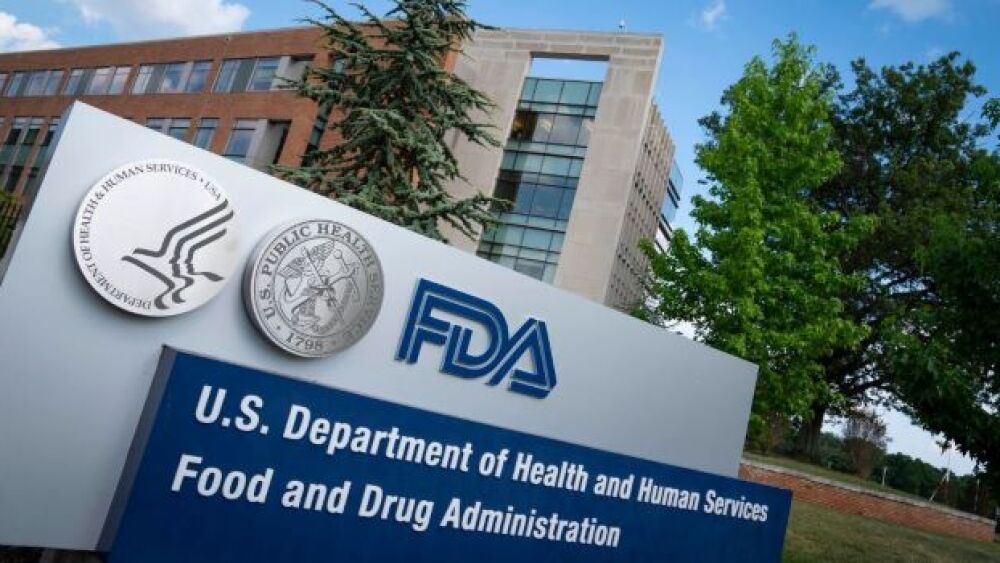The FDA is expected to make decisions on Emergent BioSolutions’ sNDA for OTC Narcan and Roche’s Polivy in frontline DLBCL.
FDA Sign in front of a building/courtesy of Sarah Silbiger/Getty Images
To cap off the first quarter, the FDA will decide on two investigational treatments: one for opioid overdose, the other for diffuse large B-cell lymphoma (DLBCL). The regulator will also convene a meeting to discuss risk management for acne pills.
Here are the details.
Emergent Seeks OTC Access for Opioid Overdose Nasal Spray
On March 29, the FDA will decide on Emergent BioSolutions’ supplemental New Drug Application (sNDA) for Narcan (naloxone HCI) Nasal Spray. The company is hoping to have Narcan approved as an over the counter (OTC) emergency treatment for confirmed or suspected opioid overdose.
Currently, patients need a doctor’s prescription to access Narcan. The drug is an opioid antagonist that works by competing with the same receptor. When administered as an emergency medication, Narcan can reverse symptoms of opioid overdose, including sedation and hypotension.
The FDA accepted Emergent’s sNDA for Narcan in December 2022 and granted it Priority Review Status. The company backed its OTC bid with human studies and more than five-years’ worth of post-marketing data showing that Narcan is both safe and effective.
In February 2023, the FDA’s Nonprescription Drugs Advisory Committee and the Anesthetic and Analgesic Drug Products Advisory Committee convened to discuss Narcan’s sNDA, weighing the benefits versus potential risks of removing the drug’s prescription requirement. The panel voted unanimously, 19-0, in favor of the OTC application.
Roche’s Polivy in Frontline in DLBCL
On April 2, the FDA will release its decision on Genentech (Roche’s) sBLA to use Polivy (polatuzumab vedotin-piiq) in combination with the R-CHP chemotherapy regimen in previously untreated DLBCL.
Polivy first won accelerated approval in June 2019 in this indication and to keep it on the market, Genentech ran the Phase III POLARIX trial, data from which also supported the sBLA.
In POLARIX, Polivy with the R-CHP regimen improved progression-free survival by 27%, indicating that the study met its primary endpoint.
However, the FDA was dissatisfied with Polivy’s magnitude of effect. In briefing documents ahead of an advisory committee meeting in March, Agency staffers wrote that it is questionable whether this rate of difference is clinically meaningful.
The regulator also flagged Polivy’s lack of significant benefit in terms of overall survival and complete response.
Despite these reservations, the Oncologic Drugs Advisory Committee, a panel of independent experts, voted 11-2 in favor of Polivy.
FDA Convenes Expert Panel for Isotretinoin REMS
On March 28 and 29, the FDA will hold a joint meeting between its Drug Safety and Risk Management Advisory Committee and the Dermatologic and Ophthalmic Drugs Advisory Committee.
The two committees will discuss proposed changes to the Risk Evaluation and Mitigation Strategy (REMS) program for isotretinoin oral capsules to minimize the burden on patients, pharmacies and prescribers.
Isotretinoin, sold under the brand name Accutane, among others, is an oral medication for severe acne. In 2005, the FDA established the iPLEDGE Program, which was designed to help prevent fetal exposure to isotretinoin, which has been shown to pose birth defects. The iPLEDGE REMS program covers all FDA-approved isotretinoin products and is a centralized system to manage related risks.
In December 2021, the FDA implemented modifications to iPLEDGE REMS which involved reducing patient risk categories from three to two. Under the new REMS classification, prescribers can only classify their patients as those who can get pregnant and those who can’t.
The changes also affected pharmacies, requiring them to obtain a risk management authorization before dispensing isotretinoin.






